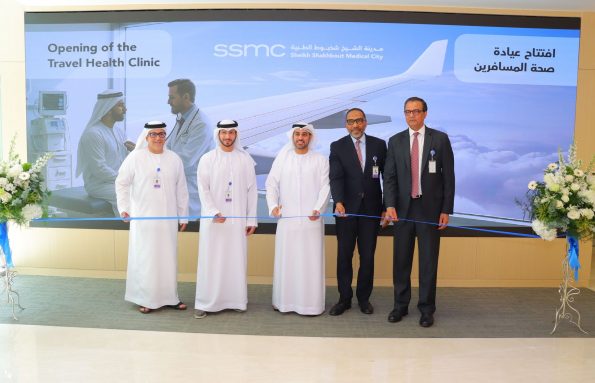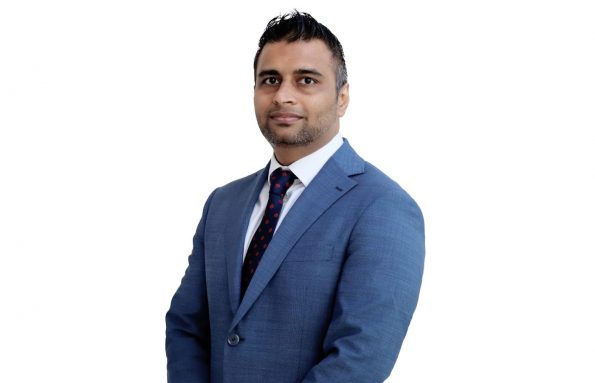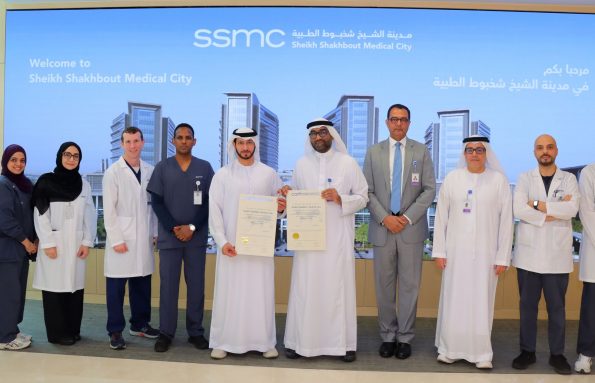- After months of intensive care at SSMC, healthy twins were discharged despite being born extremely prematurely with a 30 percent chance of survival and a high risk of disability.
- The boy and girl are now home with their family, walking and talking, with a full life ahead of them.
Sheikh Shakhbout Medical City (SSMC) , one of the UAE’s largest hospitals for serious and complex care and a joint-venture partnership between Abu Dhabi Health Services Company (SEHA) and Mayo Clinic, has achieved another milestone by successfully resuscitating twins, born at 22 weeks, and supporting their development until they could be discharged as healthy babies four months later.
Babies born alive at 22 weeks are extremely rare and, if they survive, they usually live to have many problems. The survival rate for babies born this early is around 3 in 10, with a 1-in-3 chance of severe disability.
Reflecting on the factors that contributed to the successful outcome, Dr. Faisal M Al Zidgali , the neonatologist who led the care and Division Chair of Neonatology at SSMC, credited the close collaboration of SSMC’s large multidisciplinary team as being critical to the survival of the twins: “Our expert team included maternal-fetal specialists, obstetricians, neonatologists, neonatal nurses, respiratory therapists, cardiologists, ophthalmologists, pediatric surgeons, clinical pharmacists, dietitians, speech and language pathologists, physiotherapists, and a case coordinator. This multidisciplinary approach reflects SSMC’s model of care, which also includes the proactive involvement of parents in the decision-making process.”
Dr. Wafaa Naji Jaber , Specialist Physician in Neonatology at SSMC, explained it was a particularly complex case: “The mother had been losing amniotic fluid for more than 18 hours, which meant there was a high possibility of infection and reduced amniotic fluid for the babies. Additionally, she wasn’t an existing patient at SSMC, and we didn’t have access to her ultrasound results or previous blood tests, and we weren’t aware whether she had gestational diabetes. During the consultation with the neonatologist, obstetrician and parents, it was decided to resuscitate the babies if they were responsive when they were born. Preparation was essential and we prepared everything beforehand as if we are going to give active resuscitation. The obstetrics team and the wider multidisciplinary team made an important decision to administer steroids and magnesium sulphate to the mother. The medication helped to provide lung and neurological support to the twins and contributed to the successful outcome of their delivery. A Caesarean section at such gestation is not usually considered as risks may outweigh benefits, therefore, a normal delivery was performed.
The baby boy and girl entered the world with extremely low birth weights of 475 grams and 504 grams respectively. The team leapt into action to resuscitate the twins by carefully inserting a breathing tube and settling them on ventilators.
The twins were then transferred to SSMC’s advanced Neonatal Intensive Care Unit (NICU), where they were stabilized and provided nutrition and antibiotics in a carefully controlled, sterile environment. For the next five months, their every moment was monitored, as each member of the multidisciplinary team provided expertise to ensure they developed as though they were still in the womb.
The babies’ father, S.A., said: “It was a very stressful time as the prematurity period lasted for about six to seven months and we had to visit the hospital twice daily. The SSMC team were very attentive and caring and made sure to keep us fully informed every step of the way, which reassured us that our babies were receiving the very best care. As each day passed and our little ones got stronger, we became more and more confident that everything was going to be okay. I can’t thank the SSMC team enough.”
Dr. Deanne Kashiwagi , deputy chief medical officer of SSMC, said: “This really is a remarkable case, which we are immensely proud of. The odds for babies born so prematurely are very low, and it’s only because SSMC can provide cutting-edge care for complex cases by combining multidisciplinary expertise with world-leading equipment and protocols that this outcome was achieved. The fact that there are now two happy, healthy infants at home with their family further establishes SSMC as a leading health care facility for complex and critical care.”






